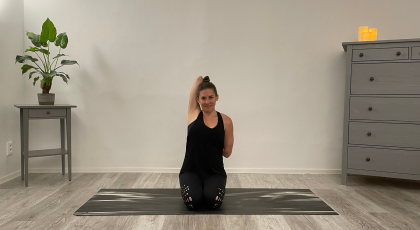View basket (0 items $0.00)

Are You Eating Too Much of a Good Thing?
Raise your smoothie if this sounds familiar:
Picking at that plate of dates with nut butter because they happen to be there. Cleaning up you quinoa dinner bowl, not because you’re still hungry but because there’s not enough for leftovers. Eating Asian turkey sliders (three of ’em) because it’s a party, that’s what you do! Washing it all down with a strawberry shortcake smoothie because it’s Friday.
Truth be told: I’ve been there. Left to my own devices I can eat tray after tray after tray of roasted sweet potatoes. While I’m all for “eating your vegetables” (and it could be a far less healthy indulgence), I just don’t feel good when I eat well past the point of no longer being hungry and maybe even to the point of discomfort.
And for most of us, when we eat too much—whether it’s a big, juicy burger and fries or seared, freshwater salmon and salad—those feelings of overindulgence can lead to a slippery slope of guilt and cause us to feel bad about ourselves. We might find ourselves staring at that empty jar of almond butter and think: “I have no willpower,” or “Why can’t I control myself around food?” or “I’ll never be happy with myself until I learn to shut my mouth.”
You deserve better than this. Your heart and mind deserve better; your body deserves better. No matter what we’re eating, our meals and our bodies need to be treated with love and respect. Respect means tuning in and paying attention so that we can listen to our bodies when they say they’ve had enough. (Yes, even enough kale salad.) It means turning our mind toward the food that we eat and then paying attention when we’re eating it.
Mindlessness vs. Mindfulness
If you can relate, then it’s likely that you’re not tuning into your body during meal times. That is, you’re eating—or overeating—just because it tastes good without making any connection to your body’s true hunger level or the signals it gives you when you’re satiated. (Hello, third bowl zucchini pasta!)
If you find yourself nodding along, here are a few things I’ve done to help me stop picking at the chocolate truffles when I know I’m full:
-
Put your food on a plate and sit down
Obvious? Yes. Worth a reminder? Yes. Next time, pour yourself a tall glass of spa water, put those cookie dough balls on a plate and sit down. You will be amazed by how much better (and more nourished!) you feel when your body recognizes that you’ve eaten! -
Ask yourself if you’re really, actually hungry
Many of us eat for reasons other than hunger—stress, boredom, loneliness. Drink some water and check in with yourself: when was the last time you ate? Are you eating for the right reasons? -
Resist the siren song of the screen
I know it can be so, so hard to tear your eyes away from the computer, television or phone, but you’ll be glad you did. Multitasking takes us away from the food in front of us. As simple as it sounds, eat when you’re eating. -
Slow down and chew your food
Again, I realize this sounds painfully obvious, but many of us gulp down our smoothies and chomp our vegetables once or twice. Our brains don’t immediately register that our stomachs are full, so when we eat too fast, we’re literally outpacing our body’s ability to communicate that we’re full. Chewing is an important step in the digestion process, and if you don’t chew thoroughly, it’s also harder for your body to absorb all the nutrients and energy from the food you’re eating.
Of course, none of us are perfect. Even the healthiest and most intentional among us will occasionally find herself mindlessly eating chocolate protein bars in the car. But let’s make a commitment to eat better: slowly, mindfully, and consciously while leaning into our body’s intuition.
You’ll never go wrong when you’re listening.
Another inspiring article from YogaUOnline and Elise Museles: Your Body Knows-Tune In.
Printed with permission from kaleandchocolate.com
 Elise Museles is an attorney turned Certified Eating Psychology & Nutrition Expert and creator of Kale & Chocolate. A writer, speaker, teacher and healthy lifestyle advocate, she empowers people to reset their relationship with food & their bodies—by creating a happy, healthy, and ridiculously delicious Food Story. Elise is also the author of the newly released book, Whole Food Energy, (Barron’s Educational Series, January 2016) and shares daily inspiration (and mouth-watering photos!) on FaceBook and Instagram.
Elise Museles is an attorney turned Certified Eating Psychology & Nutrition Expert and creator of Kale & Chocolate. A writer, speaker, teacher and healthy lifestyle advocate, she empowers people to reset their relationship with food & their bodies—by creating a happy, healthy, and ridiculously delicious Food Story. Elise is also the author of the newly released book, Whole Food Energy, (Barron’s Educational Series, January 2016) and shares daily inspiration (and mouth-watering photos!) on FaceBook and Instagram.
Featured Courses








